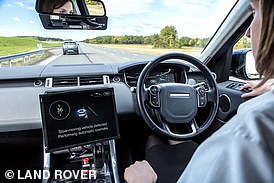Drivers could face double the level of congestion on roads if self-driving cars grow in popularity
>
Motorists could face double traffic jams as self-driving cars gain popularity, report warns
- Delays could be up to 85 percent from 2025 to 2060 with self-driving cars
- The analyzes were based on autonomous vehicles that will make up half of the cars in 2047
- By 2022, British drivers lost an average of 80 hours due to congestion, other data shows
Motorists could be trapped in traffic jams twice as bad as current levels when self-driving cars become commonplace, a government report warns.
Delays could be as high as 85 percent between 2025 and 2060 in that scenario, according to traffic projections from the Department for Transport.
The analysis is based on autonomous vehicles making up half of the fleet by 2047, along with a “rapid rise” of electric cars.
When fully self-driving cars become more mainstream and share the roads with human drivers from 2025 to 2060, traffic delays could be as high as 85%
This would lead to more traffic by “increasing the mobility of the elderly and non-licence holders,” according to the report published last month.
It claims that ‘the ability to work or relax while traveling in a self-driving car’ means that occupants ‘will be more likely to sit in traffic’.
RAC Foundation director Steve Gooding said: ‘There are 5.9 million licensees aged 70 or over in the UK, so we know the demand for mobility is there among senior citizens.
In the near future, automated vehicles offer the tempting prospect of independence for the many millions of people who fall into the older age group, but for whatever reason – cost, medical constraints – are not currently driving.’
Mr Gooding said the way autonomous technology is deployed will be significant.
He said, “If we are willing to forego personal property, we can have a win-win situation: quieter roads, fewer cars shared by many, and cheaper transportation.”
A recent analysis by traffic information provider Inrix found that British drivers lost an average of 80 hours to traffic jams last year, an increase of seven hours from 2021.
In London, drivers spent an average of 156 hours in traffic.
Fully self-driving cars are not legal in the UK, but autonomous features are being developed by car manufacturers.
In August last year, the DfT said it expected self-driving vehicles to be available for use by 2025.
Several reports have pointed to an increase in congestion and a potential increase in collisions as fully autonomous vehicles become more popular and begin to share the roads with human drivers.

